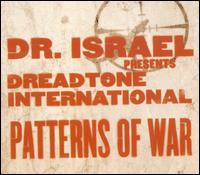Dr. Israel presents Dreadtone International, "Patterns of War"
 For most in the international community, the last few years have been anything but good, chock full of bad news and an ever-worsening outlook for the future (United Defense stockholders aside). But for Brooklyn's Dr. Israel, all the war, death and destruction around the globe had a silver lining: how else would he have been able to muster all the outrage and righteous indignation that is Patterns of War?
For most in the international community, the last few years have been anything but good, chock full of bad news and an ever-worsening outlook for the future (United Defense stockholders aside). But for Brooklyn's Dr. Israel, all the war, death and destruction around the globe had a silver lining: how else would he have been able to muster all the outrage and righteous indignation that is Patterns of War?Roir
His first album in three years and the first released under the loose collective Dreadtone International, Patterns of War sees Israel's signature sound—a unique, loose amalgam of reggae, dub, jungle and hip-hop plus whatever else Israel sees fit to throw in—complemented by two female backup singers, the deep-throated Lady K and the lighter, more silky Chemda. Their mere addition is a bit of a departure for Israel, but more striking is the ultra-polished sound, a faux pas for most roots rockers, as reggae music tends loses a little bit of its vitality with too many slick studio tricks.
But Patterns of War does its best to make up for it with the sheer weight of its message. The album lives and breathes political activism, from garden-variety criticism of American foreign policy (Tetze) to prayers for wage slaves struggling to make ends meet day-to-day (Counting Out Stones).
While it's sure to make cynics issue a collective eye-roll, there's no doubting Dreadtone International's sincerity. When the message and the music hit peaks simultaneously, the record is truly moving: music to rock both the body and the nation in the best roots tradition. That is, if you can get past the kicker. Unless you're a 16-year old heading to your first war protest (and, you hope, your first joint with that dreadlocked cutie afterwards), you've heard it all before numerous times. For all the amazing musical blends Israel welds together, there's not a single unique thought—or even a truly memorable delivery. And in a cruel twist, the pedestrian lyrical material makes it difficult to tune in and focus on the real gem of the album: Israel's amazing production chops. Ironically, it's a challenge that's made all the more difficult the more earnest the album tries to be.
The final blow is that Israel's impressive instrumentation compounds the problem. It's truly breathtaking in its scope and the ways it soars and dives, but the complexity and disparity are wearisome. Consider: the supercharged Middle-Eastern tinged jungle-hip hop of Tetze abruptly fades to a throbbing dub cadence punctuated with a lonely piano, which is then in turn followed by Bad Brainsian punk—only played at one-eighth speed.
Dr. Irsael just tried to do much with too much. He would do well to simplify, and take solace in the reminders that Guernica was painted in black-and-white, and no album—no matter how multifaceted—can save the world.
samples:



